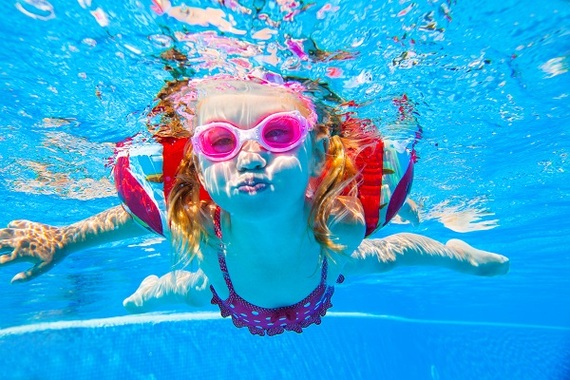As a lifelong Florida resident, I have spent my fair share of time in pools and at the beach. As much as I love it, it's kind of a health hazard. If you pay attention to social media and the news, you're probably thinking about lightning, sharks, rattlesnakes, and alligators. Here are your odds of survival.
Shark Attacks!
They're out there, lurking in the deep, coming up at you like deadly, soulless torpedoes with teeth. It's a terrifying image. So how likely are you to be attacked by a shark at the beach?
Florida has more shark attacks than all the other states put together. Between 2006 and 2010, there were a whopping 110 attacks...and one fatality. Your odds of being attacked by a shark are 1 in 11.5 million. Your odds of dying from a shark attack are just plain silly. 200 million people visit US beaches each year, and less than one per year is killed by a shark. Let's take that one off the list.
Gators? Really?
This is Florida. If you see a puddle, there's probably a gator in it. Alligators don't live in the ocean, but they do regularly freak out beachgoers with an occasional dip. Not long ago, a big ugly was captured on Fort Myers Beach.
So what's the risk? Once again, Florida is number one, with 337 documented gator attacks, 17 of them fatal. Of course, that's 1948 till now, and exactly zero of them happened on the beach. You're probably safe from beach-loving gators.
Rattlesnakes. Yep.
As if gators and sharks aren't enough, you may have seen news stories of rattlesnakes on the beach. If Florida is starting to sound a little like Australia, you're not far off. Happily, we don't have giant spiders.
Each year, there are about 7,500 snake bites in the U.S. and about 5 or 6 will die.
Pro tip: If you see a deadly snake on the beach, don't poke it with a stick.
Lightning.
It may sound like unlikely, but lightning is a legitimate danger in FL. An average of only 33 people die each year in the U.S., and less than 300 are injured. Not many, but all of them are in three states - Mississippi, Louisiana, and Florida. That number would be a lot higher if more people ignored common sense.
Simple rule: if you see lightning or hear thunder, even in the distance, get out of the water and find shelter. Not under a tree. Lightning is not to be trifled with.
What you should really worry about
All joking aside, ignore the scary SHARKNADO scenarios that aren't going to happen and pay attention to the stuff most likely to ruin your vacation. Here's what you need to stay safe and healthy here in Florida:
- Waterproof sunscreen. People with fair skin are most vulnerable, but protecting your skin is important even if your skin is dark. I've seen many tourists spend their vacations in the hospital, nursing painful blisters. Be sure to have plenty of 30+ spf waterproof sunscreen on hand. You'll avoid pain now and have a better chance at avoiding skin cancer later.
- Aloe lotion. Minor sunburn is almost inevitable, even with precautions. Keep a soothing aloe lotion on hand to replenish the moisture in your skin and soothe the sting. Beware big-brand commercial lotions. Most of them contain little aloe. If aloe isn't the first ingredient listed, pass.
- Eyewear. Your eyes are delicate and easily hurt. In addition to sun damage from UVA and UVB rays, irritants can really ruin your week. Protect your eyes from the sun, sand, chlorine (and pee, gross!), and bacteria in the water. You'll avoid painful eye infections that can sideline your fun, and long-term damage at the same time.
- Water. It is way too easy to get dehydrated. With the sun baking down and the salt pulling moisture from your skin cells, you can dry out pretty fast, and that can result in some pretty nasty side effects, starting with exhaustion, dizziness, and headache, and ending, well, you guessed it, in the hospital. Sugary drinks, caffeine, and alcohol will only make matters worse. Drink plenty of water before you go out, while you're in the sun, and after you come back in.
- Shoes. Poisonous sea creatures are unlikely to kill you, but they will leave painful reminders not to touch pretty bubbles on the sand. Man-o-wars are particularly attractive, like translucent purple blobs of screaming pain. Other things you don't want to step on include jellyfish, crabs, and broken shells. The good news is you can avoid most danger by wearing flip-flops and resisting the urge to touch shiny things with tentacles.
- Lifeguards. Stay near a lifeguard station, especially if you have small children. They use flags to alert beachgoers to hazards, including riptides, jellyfish, sharks, and lightning.
